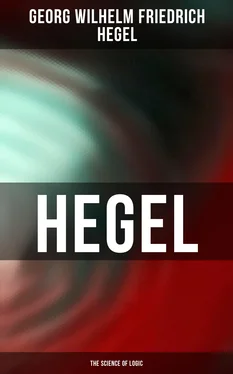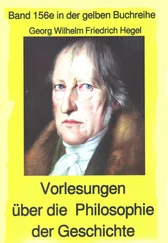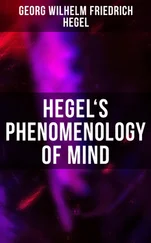The study of truth, or, as it is here explained to mean, consistency, constitutes the proper problem of logic. In our every-day mind we are never troubled with questions about the truth of the forms of thought.—We may also express the problem of logic by saying that it examines the forms of thought touching their capability to hold truth. And the question comes to this: What are the forms of the infinite, and what are the forms of the finite? Usually no suspicion attaches to the finite forms of thought; they are allowed to pass unquestioned. But it is from conforming to finite categories in thought and action that all deception originates.
(3) Truth may be ascertained by several methods, each of which however is no more than a form. Experience is the first of these methods. But the method is only a form: it has no intrinsic value of its own. For in experience everything depends upon the mind we bring to bear upon actuality. A great mind is great in its experience; and in the motley play of phenomena at once perceives the point of real significance. The idea is present, in actual shape, not something, as it were, over the hill and far away. The genius of a Goethe, for example, looking into nature or history, has great experiences, catches sight of the living principle, and gives expression to it. A second method of apprehending the truth is Reflection, which defines it by intellectual relations of condition and conditioned. But in these two modes the absolute truth has not yet found its appropriate form. The most perfect method of knowledge proceeds in the pure form of thought: and here the attitude of man is one of entire freedom.
That the form of thought is the perfect form, and that it presents the truth as it intrinsically and actually is, is the general dogma of all philosophy. To give a proof of the dogma there is, in the first instance, nothing to do but show that these other forms of knowledge are finite. The grand Scepticism of antiquity accomplished this task when it exhibited the contradictions contained in every one of these forms. That Scepticism indeed went further: but when it ventured to assail the forms of reason, it began by insinuating under them something finite upon which it might fasten. All the forms of finite thought will make their appearance in the course of logical development, the order in which they present themselves being determined by necessary laws. Here in the introduction they could only be unscientifically assumed as something given. In the theory of logic itself these forms will be exhibited, not only on their negative, but also on their positive side.
When we compare the different forms of ascertaining truth with one another, the first of them, immediate knowledge, may perhaps seem the finest, noblest and most appropriate. It includes everything which the moralists term innocence as well as religious feeling, simple trust, love, fidelity, and natural faith. The two other forms, first reflective, and secondly philosophical cognition, must leave that unsought natural harmony behind. And so far as they have this in common, the methods which claim to apprehend the truth by thought may naturally be regarded as part and parcel of the pride which leads man to trust to his own powers for a knowledge of the truth. Such a position involves a thorough-going disruption, and, viewed in that light, might be regarded as the source of all evil and wickedness—the original transgression. Apparently therefore they only way of being reconciled and restored to peace is to surrender all claims to think or know.
This lapse from natural unity has not escaped notice, and nations from the earliest times have asked the meaning of the wonderful division of the spirit against itself. No such inward disunion is found in nature: natural things do nothing wicked.
The Mosaic legend of the Fall of Man has preserved an ancient picture representing the origin and consequences of this disunion. The incidents of the legend form the basis of an essential article of the creed, the doctrine of original sin in man and his consequent need of succour. It may be well at the commencement of logic to examine the story which treats of the origin and the bearings of the very knowledge which logic has to discuss. For, though philosophy must not allow herself to be overawed by religion, or accept the position of existence on sufferance, she cannot afford to neglect these popular conceptions. The tales and allegories of religion, which have enjoyed for thousands of years the veneration of nations, are not to be set aside as antiquated even now.
Upon a closer inspection of the story of the Fall we find, as was already said, that it exemplifies the universal bearings of knowledge upon the spiritual life. In its instinctive and natural stage, spiritual life wears the garb of innocence and confiding simplicity: but the very essence of spirit implies the absorption of this immediate condition in something higher. The spiritual is distinguished from the natural, and more especially from the animal, life, in the circumstance that it does not continue a mere stream of tendency, but sunders itself to self-realisation. But this position of severed life has in its turn to be suppressed, and the spirit has by its own act to win its way to concord again. The final concord then is spiritual; that is, the principle of restoration is found in thought, and thought only. The hand that inflicts the wound is also the hand which heals it.
We are told in our story that Adam and Eve, the first human beings, the types of humanity, were placed in a garden, where grew a tree of life and a tree of the knowledge of good and evil. God, it is said, had forbidden them to eat of the fruit of this latter tree: of the tree of life for the present nothing further is said. These words evidently assume that man is not intended to seek knowledge, and ought to remain in the state of innocence. Other meditative races, it may be remarked, have held the same belief that the primitive state of mankind was one of innocence and harmony. Now all this is to a certain extent correct. The disunion that appears throughout humanity is not a condition to rest in. But it is a mistake to regard the natural and immediate harmony as the right state. The mind is not mere instinct: on the contrary, it essentially involves the tendency to reasoning and meditation. Childlike innocence no doubt has in it something fascinating and attractive: but only because it reminds us of what the spirit must win for itself. The harmoniousness of childhood is a gift from the hand of nature: the second harmony must spring from the labour and culture of the spirit. And so the words of Christ, 'Except ye become as little children,' &c., are very far from telling us that we must always remain children.
Again, we find in the narrative of Moses that the occasion which led man to leave his natural unity is attributed to solicitation from without. The serpent was the tempter. But the truth is, that the step into opposition, the awakening of consciousness, follows from the very nature of man: and the same history repeats itself in every son of Adam. The serpent represents likeness to God as consisting in the knowledge of good and evil: and it is just this knowledge in which man participates when he breaks with the unity of his instinctive being and eats of the forbidden fruit. The first reflection of awakened consciousness in men told them that they were naked. This is a naïve and profound trait. For the sense of shame bears evidence to the separation of man from his natural and sensuous life. The beasts never get so far as this separation, and they feel no shame. And it is in the human feeling of shame that we are to seek the spiritual and moral origin of dress, compared with which the merely physical need is a secondary matter.
Next comes the Curse, as it is called, which God pronounced upon man. The prominent point in that curse turns chiefly on the contrast between man and nature. Man must work in the sweat of his brow: and woman bring forth in sorrow. As to work, if it is the result of the disunion, it is also the victory over it. The beasts have nothing more to do but to pick up the materials required to satisfy their wants: man on the contrary can only satisfy his wants by himself producing and transforming the necessary means. Thus even in these outside things man is dealing with himself.
Читать дальше












